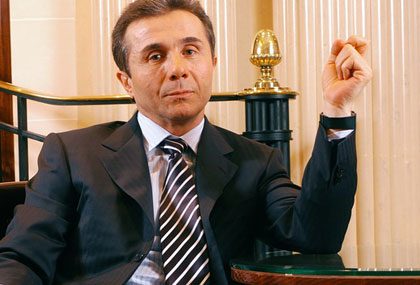
Georgia’s Political System Precarious as Ivanishvili Prepares to Resign
Publication: Eurasia Daily Monitor Volume: 10 Issue: 168
By:

Georgia’s billionaire Prime Minister Bidzina Ivanishvili insists he will resign from government and quit politics altogether after the October 27, 2013 presidential election. Ivanishvili first entered politics in October 2011, won the parliamentary elections and took over power at the head of his Georgian Dream coalition in October–November 2012, and will have served only one year as prime minister if he withdraws as announced. He has declared his intention to build up civil society organizations under his leadership and—as is generally understood—munificent sponsorship (see EDM, August 2).
Ivanishvili has all along maintained that he dislikes politics and governance. According to Tbilisi insiders, he resents having to micro-manage the government by force of circumstances. His work style as prime minister bears this out. Ivanishvili operates the government from his Tbilisi palace or his seaside residence near Batumi, relying on a few personal confidants for informal advice, and easily bypassing the cabinet of ministers when announcing his decisions or initiatives. This situation was almost pre-ordained from the outset. The six-party coalition government lacks internal coherence, while its component parties owe their existence and entry into parliament since 2012 mainly to Ivanishvili’s funding (see EDM, July 24, 2012).
Considering the weakness of Georgian institutions, Ivanishvili’s early and unprepared resignation could result in a vacuum at the center of power, with potentially destabilizing consequences (see EDM, September 9). The 2012 regime change halted the institution-building processes that had advanced under the preceding government of the United National Movement (UNM).
Within the current party system, Georgian Dream is Ivanishvili’s proprietary party. The eponymous six-party coalition, forming the parliamentary majority, is too fractious to hold together, once Ivanishvili abandons it. Until now, Ivanishvili has made no attempt to build Georgian Dream as a governing party, and has actually discouraged the coalition parties from creating viable organizations in the country. Ivanishvili has encouraged the Kremlin-friendly Nino Burjanadze to compete against UNM’s candidate for second place in the upcoming presidential election, so as to build up Burjanadze’s party. If this scenario materializes, a Moscow-approved party will enter Georgia’s political system this year for the first time since 1990. The UNM, reduced to minority status and severely harassed by the government, remains nevertheless the most coherent, value-based independent party in Georgia.
Within the executive branch, the Ministry of Internal Affairs and the General Prosecutor’s Office are being used in part to repress the opposition UNM. The heads of these agencies transitioned in 2012 from Ivanishvili’s private employ directly into the government. Ivanishvili has personally designated Georgian Dream’s presidential candidate, Giorgi Margvelashvili, and has announced that he would also pick the candidate for prime minister (Civil Georgia, September 9).
Georgian Dream is now moving to curtail the powers of the prime minister, transferring some of those powers to the parliament. Since Ivanishvili plans to step down as prime minister, he is no longer interested in the powers of that office. On the contrary, by reducing its powers, Ivanishvili would deal with a weakened head of government after the handover. The UNM also favors transferring some prerogatives from the prime minister to the parliament. The parliament is currently adopting the corresponding amendments to the constitution by cross-party consensus (Civil Georgia, September 20).
“Co-habitation” between Ivanishvili’s government and President Mikheil Saakashvili was a defining issue for Georgia’s institutional setup during the transitional period from October 2012 (when Georgian Dream won the parliamentary elections) to October–November 2013 (when the presidential election is scheduled and Saakashvili’s term will expire). Co-habitation’s one clear achievement was the UNM’s immediate handover of power to the election winners. Georgia’s partners in Europe and the United States advised the Georgian Dream government to refrain from political misuse of law enforcement agencies against the former government. But with scores of UNM politicians arrested, investigated and prosecuted on, as yet, unsubstantiated charges, political co-habitation cannot be deemed successful. The co-habitation issue is now turning into the issue of how the government treats the political opposition. Within the local self-government system, Georgian Dream has physically taken over district and municipal authorities throughout the country during 2013, without awaiting the local elections that are due to be held country-wide in the spring of 2014.
All this points to erosion of Georgia’s institutional system and, correspondingly, concentration of power in the top leader’s hands. Ivanishvili’s power operates both officially and informally, on both the political and the personal level. Below him, the institutional base looks thinner and more precarious than that which he found when he took over state power. In these circumstances, Ivanishvili’s intention to abandon the governance looks capricious and potentially destabilizing to the political system.
Compounding Ivanishvili’s political supremacy is his capacity to leverage his wealth, which equals almost one half of Georgia’s annual gross domestic product. While intending to abdicate from political power (as seems increasingly likely), Ivanishvili envisages launching several investment and development funds in Georgia, amounting to multi-billion dollar sums. The overall concept involves using parts of his own wealth as seed capital, and attracting larger amounts of foreign capital. At this stage of his planning, he considers creating: 1) an agricultural and rural development fund (this has commenced operations); 2) a sovereign wealth fund to support mainly energy and high-tech projects; and 3) a private investment fund to support new commercial ventures in Georgia (“Remarks by Georgian Prime Minister Bidzina Ivanishvili at the Riga Conference in Latvia,” September 7).
How all that would work in practice, and how foreign investors might respond, seems far from clear at this point. Ivanishvili’s resignation from government would at least remove the issue of conflict of interest. In parallel with this role as the country’s chief investor, Ivanishvili looks set to take over Georgia’s civil society as its chief mentor. Whether he intends to retain some levers of political control, bypassing the formal institutional setup, is a critical question for Georgia at this stage.




